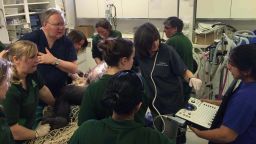Story highlights
Endangered baby Lowland Gorilla delivered by Caesarian at zoo in western England
Vets feared mother was suffering from pre-eclampsia, leading causes of illness and death in human mothers
Professor David Cahill has delivered hundreds of babies by Caesarian section.
But on February 12, he was faced with a rather rare case.
The operating theater was at Bristol Zoo, in western England, and the mother-to-be was an endangered lowland gorilla named Kera.
The zoo’s veterinary team feared she was suffering from pre-eclampsia, one of the leading causes of illness and death in human mothers and infants in the world.
READ MORE: These park rangers would die to save mountain gorillas

There was no time to waste. The obstetrician rushed to the zoo.
“There was this enormous gorilla on the table and even though she was asleep, she was still making gorilla-type noises,” Cahill told CNN.
Her keepers surrounded the table, each holding Kera’s hands and feet to monitor for the slightest twitch, an indication she was coming out of her sleep.
Cahill was told by the zoo team “not to worry if she woke up,” the anaesthetist would put her back to sleep again within seconds.
With his mind at ease, Cahill was able to get on with the procedure as he would in any other emergency case.
The anatomy of a gorilla’s reproductive system is the same as a human’s, just on a larger and more powerful scale.
“It took longer than I expected,” Cahill said. “She was much stronger in her muscles so I had to use a little bit more effort to get the baby out.”
Within an hour, he had delivered his first baby gorilla. A little girl weighing just over a kilogram (2lbs, 10oz).
But the emergency was far from over. The infant required immediate resuscitation and didn’t breathe normally for 2-3 hours.
“Her mother had been asleep for more than an hour so the baby was probably affected by the gases.”
Eleven days after the rare birth, the baby, which is yet to be named, is now receiving round-the-clock care by the zoo’s veterinary team. The baby is being fed formula milk every three hours and is already showing signs of character, letting the staff know exactly when she is hungry, much like a human.
“It is still very early days, but we are cautiously optimistic and will be keeping a very close eye on both her and Kera,” said vet Rowena Killick, who helped with the emergency resuscitation.
Cahill has been back to the zoo to check on his unusual patients and says he’s delighted to report they are both doing well.
While every birth is special, he said this delivery was one of the most exciting and unforgettable things he’s ever done.
Bristol Zoo hopes to share the baby gorilla – the latest member of a managed breeding program – with the public in the future, but that won’t be for a while.


